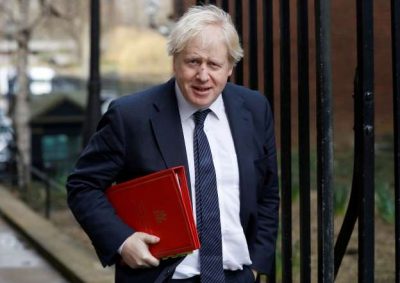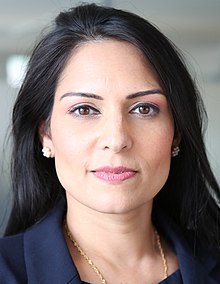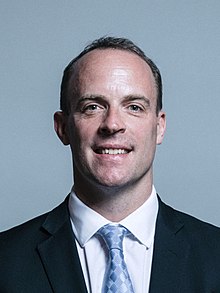Britain’s New Government: Where Do Boris Johnson’s Ministers Stand on the Middle East?
One is an MEK fan, another studied in Ramallah and one is a dove on Iran, all are pro-Israel

The UK’s newly installed prime minister, Boris Johnson, has spared no time in appointing a set of government ministers that better reflect his new agenda – most importantly with regards to a no-holds barred approach to take Britain out of the European Union.
But while much has been written of Johnson’s Middle East connections – from his Turkish ancestry to his bungling of the case of Nazanin Zaghari-Ratcliffe – his new team present a whole new set of baggage with regards to the region.
Middle East Eye takes a look at some of the highlights:
Priti Patel – home secretary

A longtime figurehead for the hard right of the Conservative Party – she has regularly called for the return of the death penalty – Patel was embroiled in scandal in 2017 after she went on an unauthorised trip to the occupied Golan Heights and met with numerous Israeli officials.
She held up to a dozen meetings with top Israeli officials during the August trip – including Prime Minister Benjamin Netanyahu – which she later claimed had been a “private holiday”.
The scandal, branded a “serious breach of the ministerial code” by an opposition MP, led to her resignation from her role as international development secretary.
As a major backer of the Leave campaign during the UK’s 2016 EU referendum, she repeated the oft-criticised mantra that Turkey would soon be joining the EU, with the resultant migration fears that it entailed.
Sajid Javid – chancellor
The most powerful politician of Muslim background in the UK once told a meeting of the Conservative Friends of Israel that if he had to live anywhere in the Middle East it would be Israel.
“I am a proud, British-born Muslim, and I love my country more than any other place on earth,” he told the Conservative Friends of Israel annual lunch in 2012.
But when it came to the Middle East, “there is only one place I could possibly go”, he explained.
“The only nation in the Middle East that shares the same democratic values as Britain. And the only nation in the Middle East where my family would feel the warm embrace of freedom and liberty.”

He has also taken a heavy hand against Israel’s enemies. In February 2019, he added the political wing of Hezbollah to the UK’s terror list, fully proscribing the entire organisation along with its already outlawed military wing.
Despite this, he also gave a speech in 2016 espousing the possibilities for new trade deals opened up by the 2015 nuclear Iran deal.
“It’s home to a potential market of almost 80 million people – and it’s home to an almost unlimited range of opportunities for British businesses,” he said, adding that regardless how the then-future referendum on EU membership went, “our future lies beyond the usual suspects and our traditional Anglophone allies”.
Perhaps Javid’s most controversial policy decision as home secretary was his decision to prevent British Islamic State group member Shamima Begum from returning to the UK by attempting to strip her of her citizenship.
The death of Begum’s baby in al-Hol refugee camp in Syria following his decision saw Javid branded a “moral coward”.
Gavin Williamson – education secretary
Williamson, who was sacked only in May after “compelling evidence” came to light that he leaked details of a National Security Council meeting to the press, has been one of the most overtly hawkish ministers in recent history.

In 2018 he described the UK as having become “too timid” following its wars in the Middle East and praised “properly considered” military intervention.
“I think our confidence was knocked by the conflicts in Iraq and Afghanistan… actually we became too timid in terms of saying, ‘Do we get involved?’” he told a conference hosted by the Conservative Home website and defence contractor Raytheon.
“Where Britain’s strength has always been as a nation is to have the confidence and the belief to say we’re doing this because it’s the right thing to do, it’s in our national interest to do.”
In December 2017, he signed a $6bn deal to sell 24 Typhoon jets to Qatar, and lauded the “Qatari military’s mission to tackle the challenges we both share in the Middle East, supporting stability in the region and delivering security at home”.
He was also part of a lobbying effort to secure a loophole with the German government to allow the UK government to continue selling planes for use in Yemen.
Dominic Raab – foreign secretary
Although largely seen now as one of the hardest of the hard right in the Conservative Party, Raab began his career working as an international lawyer and even spent a stint at the human rights organisation Liberty.

Also unlike most on the hard right, he has worked closely with Palestinian groups, even spending a summer in 1998 working at Birzeit University in the occupied West Bank city of Ramallah, working with a Palestinian peace talks negotiator.
Nevertheless, he has largely been supportive of Israel, writing articles condemning UN recognition of a Palestinian state, despite criticising Benjamin Netanyahu’s “right-wing, Likud-led” administration.
In a 2010 blog post he also attempted to reason why Israeli forces attacked the Mavi Marmara ship attempting to break the Israeli blockade of the Gaza Strip, an incident in which 10 pro-Palestinian activists were killed.
With regards to Saudi Arabia, Raab urged the UK not to allow the murder of the Saudi journalist Jamal Khashoggi in Istanbul in October to undermine the UK’s relationship with Riyadh.
Although he said the killing was a “terrible case” and that the initial explanations given by the Saudis were “not credible”, he said that ultimately the relationship needed preservation.
“We are not throwing our hands in the air and terminating the relationship with Saudi Arabia, not just because of the huge number of British jobs that depend on it but also because if you exert influence over your partners you need to be able to talk to them,” he told the BBC.
Ben Wallace – defence secretary
One of the few high profile pro-Remain ministers in the new government, Wallace has conceded himself that he has been “accused by some of being too pro-Iran”.

Wallace chaired the All-Party Parliamentary Group on Iran and has been one of the most frequent parliamentarians to visit Iran.
In 2011, at the height of US sanctions on Iran, he warned during a meeting of the group that sanctions “do not work” and said that “Iran should be one of our natural partners in the region and that we should be seeking to ensure that Iran becomes a firm friend.”
During a 2014 debate in the House of Commons, he sought to explain Iran’s nuclear ambitions.
“Iran has had nuclear ambitions, whether civil or military, for decades. They have been part of its psyche,” he said.
“It lives in a rough neighbourhood; it has rivalries that we can, perhaps, only understand as having similar aspects to those in the cold war and with the Soviet Union; and it is surrounded by ethnically and religiously different economic and military rivals. That has often driven some of its insecurities.”
Unlike his colleague Sajid Javid, he was also cool on the proposal of fully proscribing Hezbollah, saying in 2018, while secretary of state for the Home Department, that the “military and political activities of Hezbollah are distinct”.
Theresa Villiers – environment secretary
Apart from being a vice-chair of Conservative Friends of Israel, Villiers has also been a vocal supporter of the Mujahedeen e-Khalq (MEK), an Albania-based Iranian opposition group which has been accused of being a “cult” by many critics.

She spoke at an event hosted by the National Council of Resistance in Iran (NCRI), a known MEK front group, in August and praised the organisation, saying she hoped its leader Maryam Rajavi would be able to one day “put into effect her 10-point plan”.
“I am so grateful to be able to address this gathering for the second year in the row to support the cause for a free and democratic future for Iran,” she told the gathering.
“They are prepared to stand up for their rights and equality and dignity, even if this could lead to harassment and risk of reprisal from a brutal regime.”
She is also set to attend a rally in London on 27 July by the MEK alongside a number of other British MPs.
Michael Gove – chancellor of the duchy of Lancaster
Despite the archaic title of his new role in the Johnson cabinet, Gove still maintains a high profile in the Conservative Party and his self-description as a “neo-conservative” heavily informs his views on the Middle East.

In December 2008 he described the invasion of Iraq as a “proper British foreign policy success” and shouted “disgrace” at British MPs whose votes defeated government plans to bomb Syria in 2013 in the wake of the chemical weapons attack in eastern Ghouta. He has also described himself as a “proud Zionist” and described Islamism as a “totalitarian ideology”.
In 2015 he did, however, take the unusual step of scrapping a £5.9m deal to provide development programmes in the Saudi prison system after concerns were raised about Saudi Arabia’s human rights record.
Like many of his associates in the Leave campaign for the EU referendum, he also warned about the prospect of Turkey joining the union, describing it as a “security risk” in 2016. He later claimed his campaign had been “wrong” to stoke such fears.
He has also criticised Turkey’s President Recep Tayyip Erdogan, accusing him of putting democracy “into reverse” and said the EU should be “protesting in the clearest and loudest possible manner at this erosion of fundamental democratic freedoms”.
*
Note to readers: please click the share buttons above or below. Forward this article to your email lists. Crosspost on your blog site, internet forums. etc.
All images in this article are from Wikimedia Commons

